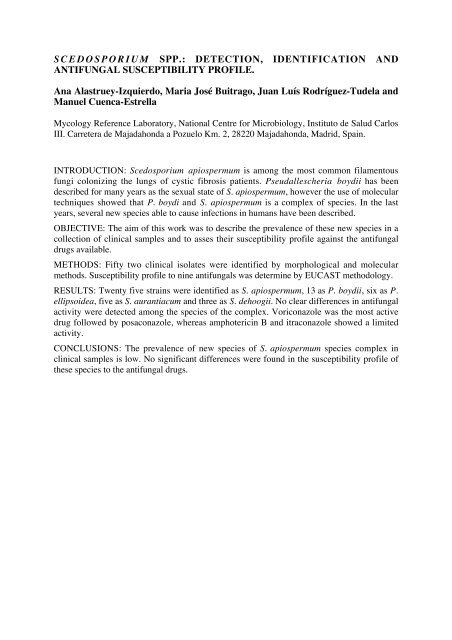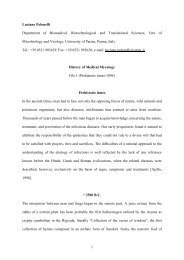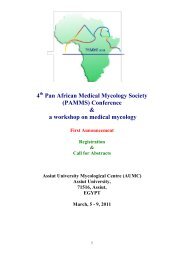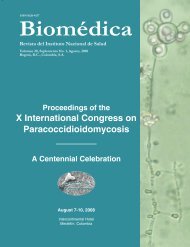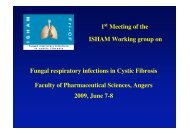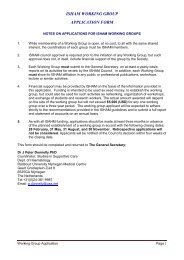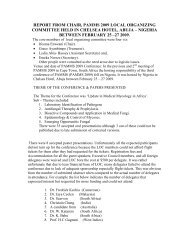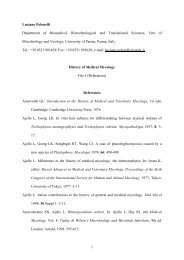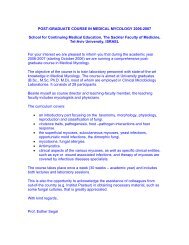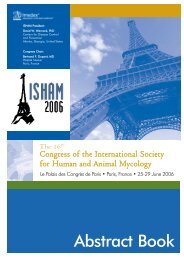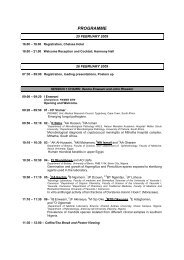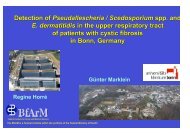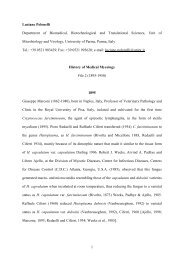SCEDOSPORIUM SPP.: DETECTION, IDENTIFICATION ANDANTIFUNGAL SUSCEPTIBILITY PROFILE.Ana Alastruey-Izquierdo, Maria José Buitrago, Juan Luís Rodríguez-Tudela andManuel Cuenca-EstrellaMycology Reference Laboratory, National Centre for Microbiology, Instituto de Salud CarlosIII. Carretera de Majadahonda a Pozuelo Km. 2, 28220 Majadahonda, Madrid, Spain.INTRODUCTION: Scedosporium apiospermum is among the most common filamentousfungi colonizing the lungs of cystic fibrosis patients. Pseudallescheria boydii has beendescribed for many years as the sexual state of S. apiospermum, however the use of moleculartechniques showed that P. boydi and S. apiospermum is a complex of species. In the lastyears, several new species able to cause infections in humans have been described.OBJECTIVE: The aim of this work was to describe the prevalence of these new species in acollection of clinical samples and to asses their susceptibility profile against the antifungaldrugs available.METHODS: Fifty two clinical isolates were identified by morphological and molecularmethods. Susceptibility profile to nine antifungals was determine by EUCAST methodology.RESULTS: Twenty five strains were identified as S. apiospermum, 13 as P. boydii, six as P.ellipsoidea, five as S. aurantiacum and three as S. dehoogii. No clear differences in antifungalactivity were detected among the species of the complex. Voriconazole was the most activedrug followed by posaconazole, whereas amphotericin B and itraconazole showed a limitedactivity.CONCLUSIONS: The prevalence of new species of S. apiospermum species complex inclinical samples is low. No significant differences were found in the susceptibility profile ofthese species to the antifungal drugs.
ABPA: BIOMARKERS FOR DIAGNOSIS AND DISEASE STAGINGCarlos E. MillaCenter for Excellence in Pulmonary Biology; Stanford University School of Medicine;Stanford, CA, USA.Allergic Bronchopulmonary Aspergillosis (ABPA) is a common complication in patients withCF, with a reported prevalence of 4.4% in the US. The colonization of the airways of CFpatients with Aspergillus, likely a consequence of disrupted mucociliary clearance, leads to aheavy allergen load on the epithelial surface and sensitization of the individual. ABPAdevelops as a result of an immune mediated response through activation and proliferation ofthe bronchoalveolar lymphoid tissue (BALT), with TH2 lymphocytes playing a central role.Immunoblasts in the BALT produce large amounts of IgE directed against specificAspergillus proteins. For reasons that probably include individual genetic susceptibility,affected patients mount a hyperIgE response that is more noticeable in the acute flares of thedisease. Additional detectable immunologic parameters in patients with ABPA includeperipheral blood and sputum eosinophilia, immediate cutaneous reactivity to A. fumigatusantigen, presence of precipitating antibodies to A. fumigatus, elevated specific IgE and IgGantibodies to A. fumigates antigen, and increased serum concentrations of IL-2 receptor (IL-2R). Thus a combination of these biomarkers has been recommended as diagnostic criteria forthe presence and staging of ABPA in the individual patient. However, given the highfrequency of colonization with Aspergillus among CF patients, it is clearly recognized that inmany patients there is great difficulty in making a determination as to the presence andactivity of the disease, with confounding factors such as polymicrobial infections, medicationsuse, and other allergic sensitizations. Therefore, there is a growing interest for thedevelopment of better biomarkers for ABPA diagnosis and monitoring. At StanfordUniversity, we have had an interest in biomarkers based on the activation of basophils.Basophils are key effectors in allergic responses, following the cross-linking by incomingallergens of membrane-bound IgE molecules. These signal through the basophil high-affinityreceptor for IgE, leading to rapid degranulation and release of histamine, tryptase,leukotrienes and cytokines. CD203c is a glycosilated transmembrane protein that is restrictedto basophils and mast cells and can be utilized as a specific marker for this cell lineage.Further, upon allergen challenge, a rapid upregulation of CD203c occurs in the basophil and itcan be used to monitor their activation state. Taking advantage of this biomarker, by flowcytometry our group has already reported that the mobilization of CD203c upon antigenstimulation can be used to monitor patients with peanut allergy in their response to therapywith IgE blockade (omalizumab). For this study, blood samples were activated in vitro withpeanut allergen and by flow cytometry surface mobilization of CD203c was monitored. Withthis assay, treatment responses were clearly demonstrated. We have taken this observationsfurther to investigate their potential utility for the detection of ABPA activity in patients withCF. Our preliminary studies in a small group of CF patients with ABPA demonstratesincreased mobilization of CD203c to the surface of basophils upon in vitro stimulation withantigen, compared to CF patients without ABPA but colonized with Aspergillus and CFpatients with no history of Aspergillus colonization or ABPA. Our ongoing studies are furthervalidating the mobilization of basophil CD203c upon stimulation as a biomarker of ABPAand its correlation with already established biomarkers of ABPA as well as with clinicalparameters of disease severity. In addition, we are evaluating the value of longitudinalmonitoring of this parameter in comparison with other biomarkers used for diseasemonitoring.


